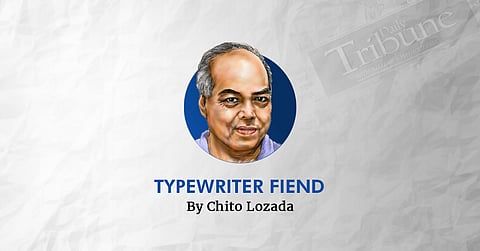
- NEWS
- the EDIT
- COMMENTARY
- BUSINESS
- LIFE
- SHOW
- ACTION
- GLOBAL GOALS
- SNAPS
- DYARYO TIRADA
- MORE

Global attention is directed not at detained former President Rodrigo Duterte, but ironically, at the institution that is holding him, the International Criminal Court (ICC), which styles itself as a global beacon of accountability and moral authority.
Just recently, ICC Prosecutor Karim Khan went on leave amid an ongoing investigation into allegations of sexual abuse and misconduct and retaliatory behavior.
Two lead counsels practicing before the Court were disciplined following allegations of workplace bullying and professional misconduct.
The disciplinary board of the ICC pronounced an 18-month suspension on Jennifer Naouri, the head of the defense team in the ICC’s last trial, its strongest sanction ever, over “inappropriate behavior” and for “damaging the reputation of the Court.”
Another counsel, Melinda Taylor, received disciplinary action for alleged office bullying.
The ICC, thus, has been in the spotlight for persistent allegations of workplace misconduct, including sexual harassment and abuse, revealing a troubling gap between the Court’s lofty mission and its internal governance.
The investigation of Khan is not an isolated incident but part of a broader, systemic pattern that undermines the institution’s credibility.
Since the ICC’s inception, reports of misconduct have dogged its leadership. In 2008, for instance, an administrative tribunal ruled against the first ICC Prosecutor, Luis Moreno Ocampo, for wrongfully dismissing a staff member who accused him of sexual violence, ordering the Court to pay damages. Under his successor, Fatou Bensouda, allegations of systemic workplace misconduct, including sexual harassment, persisted with little public resolution.
More recently, the disciplining of the two lead counsel for workplace bullying and professional misconduct, alongside the quiet departure of senior officials from the Office of the Prosecutor (OTP) amid internal investigations, illustrates a recurring failure to address toxic workplace dynamics.
While it holds global personalities accountable for alleged war crimes and crimes against humanity, the ICC’s current compliance architecture is woefully inadequate, lacking the resources, independence, and authority to handle allegations of misconduct.
The absence of robust safeguards fosters a culture in which accountability is selective, and whistleblowers face retaliation, similar to what allegedly occurred in Khan’s case. Such shortcomings erode staff morale and trust, creating a chilling effect that stifles internal dissent and reform.
The ICC’s moral authority should reflect the principles it champions globally, but it is perceived as tolerating harassment and abuse within its ranks.
The institution is viewed as being more concerned with protecting its image than confronting its flaws.
The irony lies in the institution tasked with holding the world’s worst offenders accountable being called upon to hold itself to the same standard first.
Allegations raised against Khan, which prompted his leave of absence, expose a troubling history. Since the ICC’s inception, reports of misconduct have dogged its leadership.
The ICC’s internal dysfunction triggers increased scrutiny of the Marcos administration’s decision to comply with the Tribunal’s warrant of arrest for Duterte.
The former President’s legal team, led by Nicholas Kaufman, has challenged the legality of the arrest, citing jurisdictional issues.
Also, Duterte’s allies have alleged that the arrest was a violation of a country’s sovereignty, which is a sentiment echoed by former Malaysian Prime Minister Mahathir Mohamad, who had criticized the ICC for an alleged double standard.
The internal issues of the ICC, widely reported alongside Duterte’s arrest, could bolster these claims, particularly in a polarized political landscape where Duterte retains significant grassroots support.
The ICC’s moral authority is compromised if it is seen as tolerating harassment or abuse within its ranks.
It must come clean before it can claim to the world that it has the authority to scrutinize alleged global abuses.
